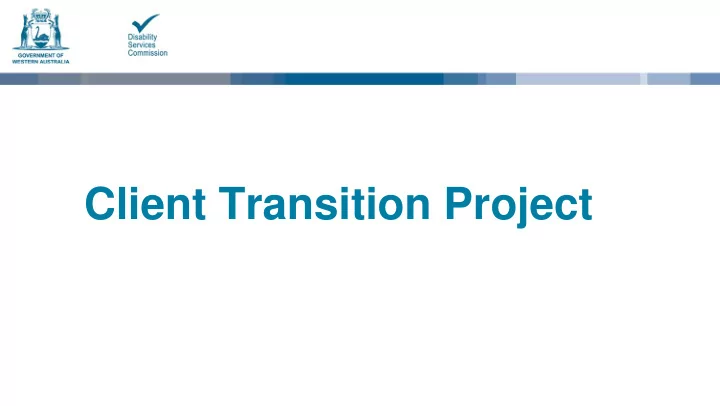

Client Transition Project
What is the Client Transition Project? • The Commission has commenced a process to transition approximately 60% of its existing accommodation service capacity to alternative service providers in the disability sector. • This will give current residents real choice and control over their supports and services. • The Commission will retain approximately 40% of current capacity. This will involve a reform of current service models plus additional emergency/ transitional accommodation services.
Background • Transitioning to a position of less direct service provision has been the Commission’s intent for some time. • The intent is to provide individuals with greater choice and control over their services and supports. • Aligned with broader national trends. • This change is strongly aligned with the approach of the NDIS. • Reflects State Government policy. • Sector readiness.
Commission Team This project is being coordinated across the Commission to ensure sustainable support models are developed for each individual transitioning. Key staff: o Sue Cannell and Neil Paynter o Wendy Cox o Gary Meyers and Lincoln Verral o Marion Hailes-MacDonald
The Transition Process - Principles • Transition will occur on a person-by-person basis. • Each resident (and their family, carer, guardian) makes an informed choice. • Groups of residents will be identified periodically to retain momentum in the transition project, but individuals may well finish at different times. • The size and frequency of groups will be determined by our experience during the first phase of the project.
The Transition Process - Prioritisation The Commission used five principles in determining which individuals would transition during the early phase: 1.Limited need for specialist support, 2.Complementary support needs within a house, 3.Needs can be fully met by an alternative service provider, and 4.The home individuals reside in is fit for purpose, or a replacement is identified, or 5.An individual self-identifies to transition. These principles were agreed by an independent panel.
The Transition Process - Practice • Families will be notified in writing before being contacted personally by the Transition Team. • The Transition Team will speak and meet with families to discuss the different options available to them. • It is anticipated that families will want to meet with and visit alternative service providers prior to making decisions. • Independent Information Officers will also be available for families who wish to talk to someone independent of the Commission and alternative service providers.
The Transition Process - Finalisation • Once an individual and their family have decided how they wish to proceed, the usual options exploration process will be engaged. • Where a group of individuals wish to remain in their current home, the Commission’s Business Directorate will liaise with other departments to facilitate transfer of the house lease and vehicle. • The Commission’s current ASD staff will work closely with the ‘receiving’ organisation to ensure a thorough handover.
Actions to date • First transition group has been notified, and is being contacted by the Transition Team. • 47 individuals • houses are in Cities of Vincent, Stirling, Armadale, Bayswater and Joondalup • Individuals in second and third transition groups have been advised they will be contacted in the first half of this year. • All other individuals have been advised they will be contacted closer to the time of their transition.
NDIS Trial Sites • In Cockburn-Kwinana, individuals will be prioritised in the same way as everyone else. o My Way Coordinators will be part of the planning process, along with the Transition Team. The accommodation option will be part of the person’s individual o plan, not the entirety of the plan. • In the Perth Hills, the precise mechanism will be dependent on discussions with NDIA. We need to ensure: o People are able to take full advantage of the process, and D isruptions to people’s lives are minimised o
Staffing Impacts • The Commission has ceased recruitment of accommodation staff. • The Commission does not anticipate any surplus staffing during the early phases of the transition process; staff will be deployed within the accommodation service. • Commonwealth legislation has the potential to impact in situations where DSOs employ ex-DSC staff; Disability Sector Organisations should seek independent advice regarding the employment of former DSC staff. [NDS is investigating this matter].
Questions?
Recommend
More recommend